lane assist Peugeot 3008 Hybrid 4 2017 Owner's Manual
[x] Cancel search | Manufacturer: PEUGEOT, Model Year: 2017, Model line: 3008 Hybrid 4, Model: Peugeot 3008 Hybrid 4 2017Pages: 566, PDF Size: 16.05 MB
Page 5 of 566
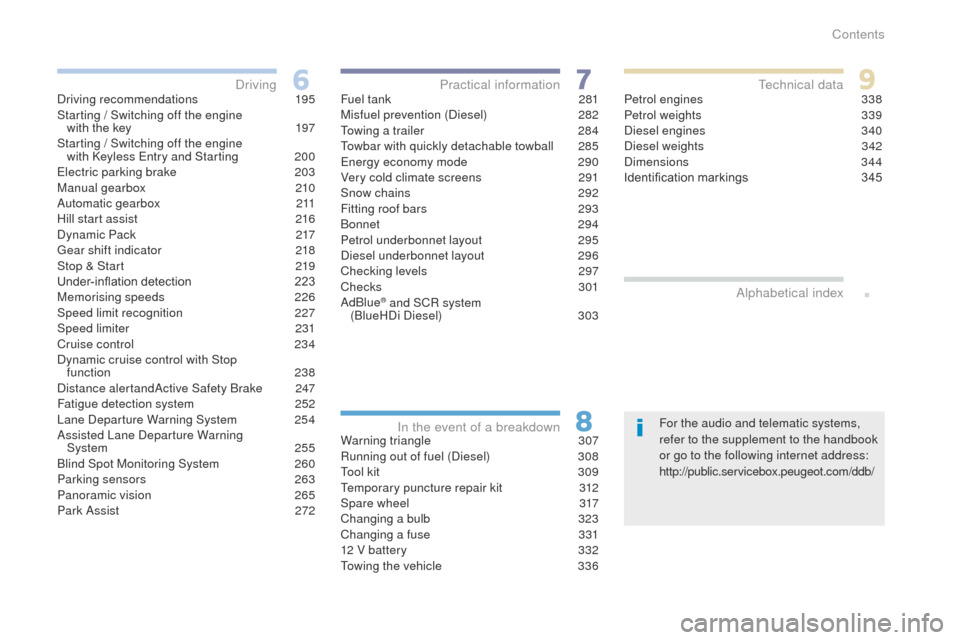
.
3008-2_en_Chap00a_sommaire_ed01-2016
For the audio and telematic systems,
refer to the supplement to the handbook
or go to the following internet address:
http://public.servicebox.peugeot.com/ddb/
Driving recommendations
1
95
Starting / Switching off the engine with the key
1
97
Starting / Switching off the engine with Keyless Entry and Starting
2
00
Electric parking brake
2
03
Manual gearbox
2
10
Automatic gearbox
2
11
Hill start assist
2
16
Dynamic Pack
2
17
Gear shift indicator
2
18
Stop & Start
2
19
Under-inflation detection
2
23
Memorising speeds
2
26
Speed limit recognition
2
27
Speed limiter
23
1
Cruise control
2
34
Dynamic cruise control with Stop function
238
Distance alertandActive Safety Brake
2
47
Fatigue detection system
2
52
Lane Departure Warning System 2
54
Assisted Lane Departure Warning System
25
5
Blind Spot Monitoring System
2
60
Parking sensors
2
63
Panoramic vision
2
65
Park Assist
2
72 Fuel tank
2
81
Misfuel prevention (Diesel)
2
82
Towing a trailer
2
84
Towbar with quickly detachable towball
2
85
Energy economy mode
2
90
Very cold climate screens
2
91
Snow chains
2
92
Fitting roof bars
2
93
Bonnet
294
Petrol underbonnet layout
2
95
Diesel underbonnet layout
2
96
Checking levels
2
97
Checks
301
AdBlue
® and SCR system
(BlueHDi Diesel) 3 03
Warning triangle
3
07
Running out of fuel (Diesel)
3
08
Tool kit
3
09
Temporary puncture repair kit
3
12
Spare wheel
3
17
Changing a bulb
3
23
Changing a fuse
3
31
12 V battery
3
32
Towing the vehicle
3
36Petrol engines
3
38
Petrol weights
3
39
Diesel engines
3
40
Diesel weights
3
42
Dimensions
3
44
Identification markings
3
45
Driving
Practical information
In the event of a breakdown Technical data
Alphabetical index
Contents
Page 6 of 566
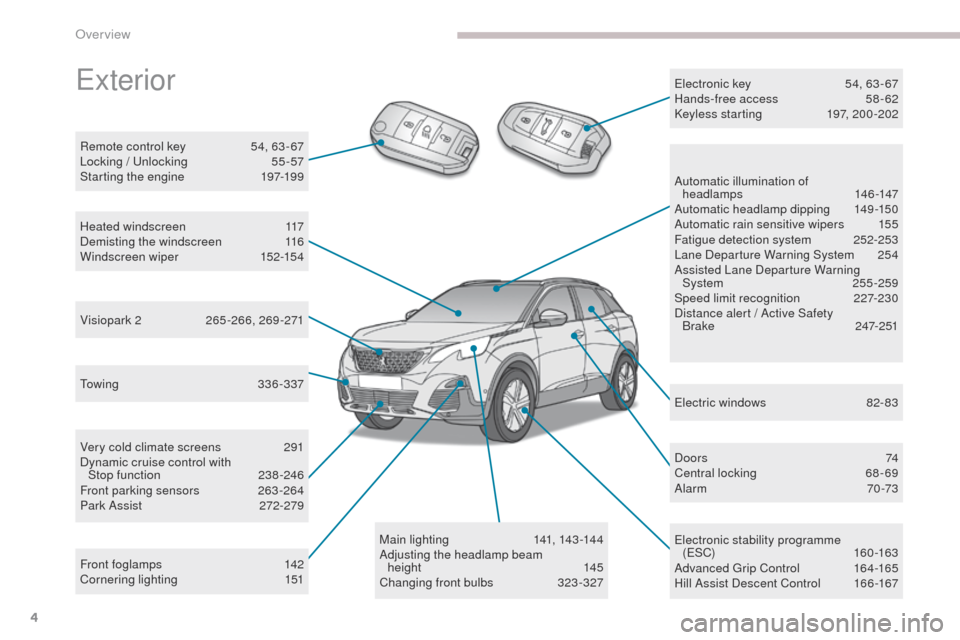
4
3008-2_en_Chap00b_vue-ensemble_ed01-2016
Towing 336-337
Very cold climate screens
2
91
Dynamic cruise control with Stop
function
23
8-246
Front parking sensors
2
63 -264
Park Assist
2
72-279
Front foglamps
1
42
Cornering lighting
1
51
Remote control key
5
4, 63 - 67
Locking / Unlocking
5
5 -57
Starting the engine
1
97-199
Automatic illumination of
headlamps
14
6 -147
Automatic headlamp dipping
1
49-150
Automatic rain sensitive wipers
1
55
Fatigue detection system
2
52-253
Lane Departure Warning System
2
54
Assisted Lane Departure Warning System
255-259
Speed limit recognition
2
27-230
Distance alert / Active Safety B r a ke
2
47- 2 51
Electric windows
8
2- 83
D o o r s
74
C
entral locking
6
8 - 69
Alarm
70-73
Electronic stability programme (ESC)
160 -163
Advanced Grip Control
1
64-165
Hill Assist Descent Control
1
66 -167
Main lighting
14
1, 143 -14 4
Adjusting the headlamp beam height
1
45
Changing front bulbs
3
23-327
Heated windscreen
1
17
Demisting the windscreen
1
16
Windscreen wiper
1
52-154
Visiopark 2
26
5-266, 269-271 Electronic key
5
4, 63 - 67
Hands-free access
5
8 - 62
Keyless starting
1
97, 200 -202
Exterior
Over view
Page 23 of 566
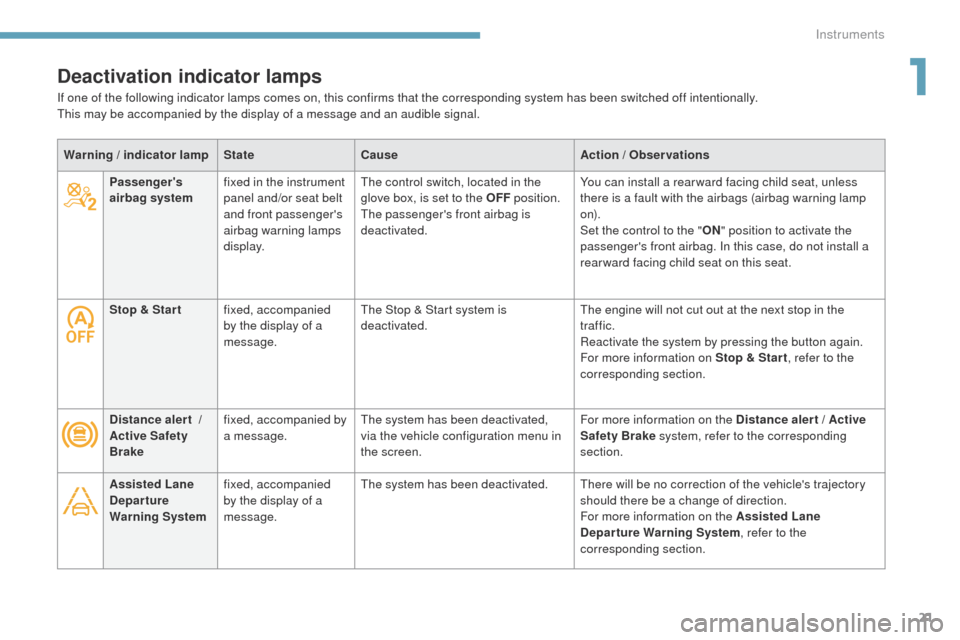
21
3008-2_en_Chap01_instruments-de-bord_ed01-2016
Warning / indicator lampStateCause Action / Observations
Stop & Star t fixed, accompanied
by the display of a
message. The Stop & Start system is
deactivated.
The engine will not cut out at the next stop in the
traffic.
Reactivate the system by pressing the button again.
For more information on Stop & Star t
, refer to the
corresponding section.
Passenger's
airbag system
fixed in the instrument
panel and/or seat belt
and front passenger's
airbag warning lamps
display. The control switch, located in the
glove box, is set to the OFF
position.
The passenger's front airbag is
deactivated. You can install a rear ward facing child seat, unless
there is a fault with the airbags (airbag warning lamp
o n).
Set the control to the "
ON" position to activate the
passenger's front airbag. In this case, do not install a
rearward facing child seat on this seat.
Deactivation indicator lamps
If one of the following indicator lamps comes on, this confirms that the corresponding system has been switched off intentionally.
This may be accompanied by the display of a message and an audible signal.
Distance aler t
/
Active Safety
Brake fixed, accompanied by
a message.
The system has been deactivated,
via the vehicle configuration menu in
the screen. For more information on the Distance alert
/ Active
Safety Brake system, refer to the corresponding
section.
Assisted Lane
Departure
Warning System fixed, accompanied
by the display of a
message. The system has been deactivated. There will be no correction of the vehicle's trajectory
should there be a change of direction.
For more information on the Assisted Lane
Departure Warning System, refer to the
corresponding section.
1
Instruments
Page 29 of 566
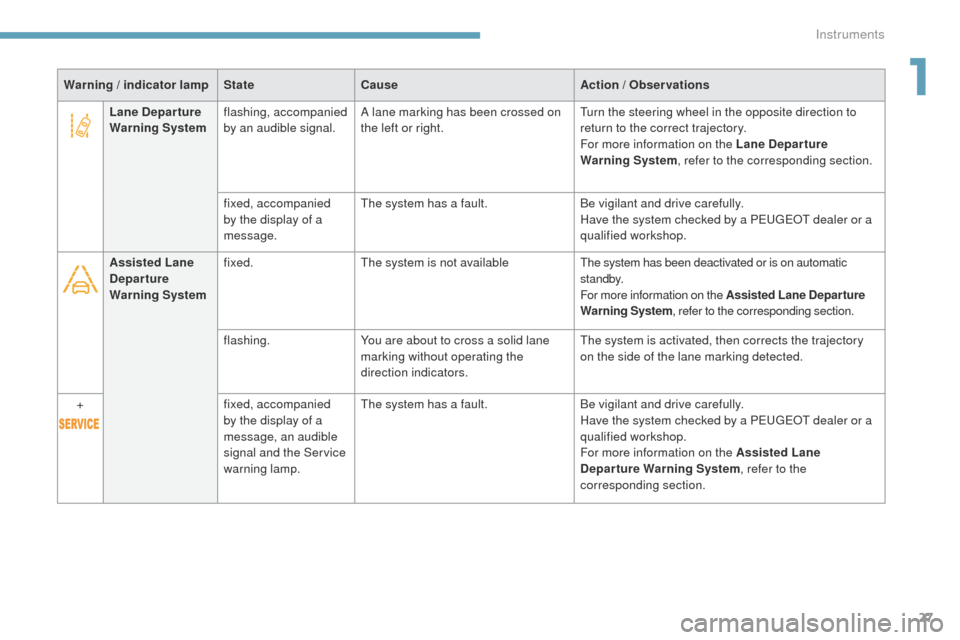
27
3008-2_en_Chap01_instruments-de-bord_ed01-2016
Warning / indicator lampStateCause Action / Observations
Lane Departure
Warning System flashing, accompanied
by an audible signal. A lane marking has been crossed on
the left or right. Turn the steering wheel in the opposite direction to
return to the correct trajectory.
For more information on the Lane Departure
Warning System
, refer to the corresponding section.
fixed, accompanied
by the display of a
message. The system has a fault.
Be vigilant and drive carefully.
Have the system checked by a PEUGEOT dealer or a
qualified workshop.
Assisted Lane
Departure
Warning System fixed.
The system is not available The system has been deactivated or is on automatic
st a n dby.
For more information on the Assisted Lane Departure
Warning System, refer to the corresponding section.
flashing. You are about to cross a solid lane
marking without operating the
direction indicators. The system is activated, then corrects the trajectory
on the side of the lane marking detected.
+ fixed, accompanied
by the display of a
message, an audible
signal and the Service
warning lamp.The system has a fault.
Be vigilant and drive carefully.
Have the system checked by a PEUGEOT dealer or a
qualified workshop.
For more information on the Assisted Lane
Departure Warning System, refer to the
corresponding section.
1
Instruments
Page 53 of 566
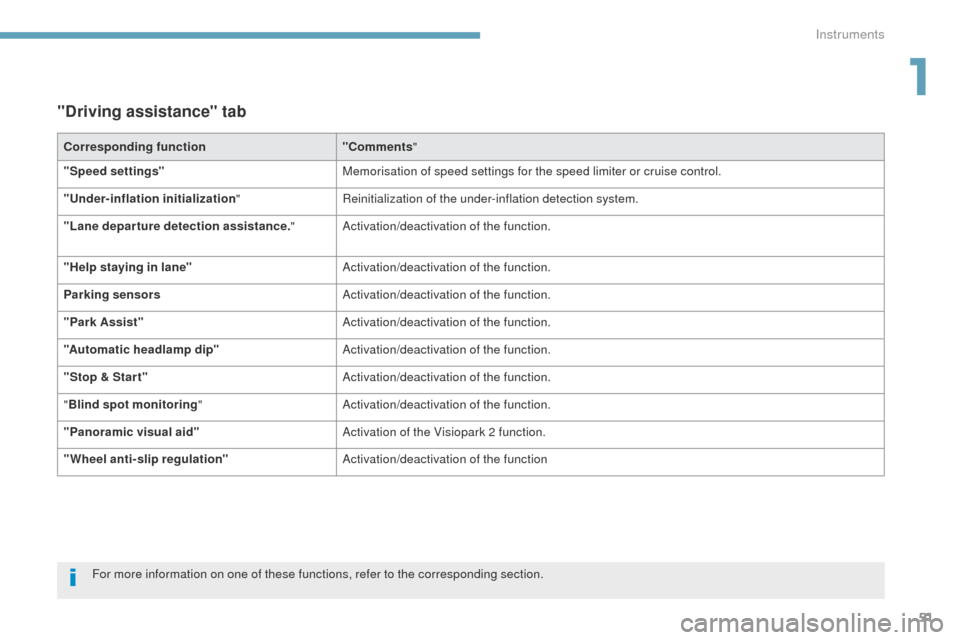
51
3008-2_en_Chap01_instruments-de-bord_ed01-2016
"Driving assistance" tab
Corresponding function"Comments"
"Speed settings" Memorisation of speed settings for the speed limiter or cruise control.
"Under-inflation initialization "Reinitialization of the under-inflation detection system.
"Lane departure detection assistance. "Activation/deactivation of the function.
"Help staying in lane" Activation/deactivation of the function.
Parking sensors Activation/deactivation of the function.
"Park Assist" Activation/deactivation of the function.
"Automatic headlamp dip "Activation/deactivation of the function.
"Stop & Star t" Activation/deactivation of the function.
" Blind spot monitoring " Activation/deactivation of the function.
"Panoramic visual aid" Activation of the Visiopark 2 function.
"Wheel anti-slip regulation" Activation/deactivation of the function
For more information on one of these functions, refer to the corresponding section.
1
Instruments
Page 240 of 566
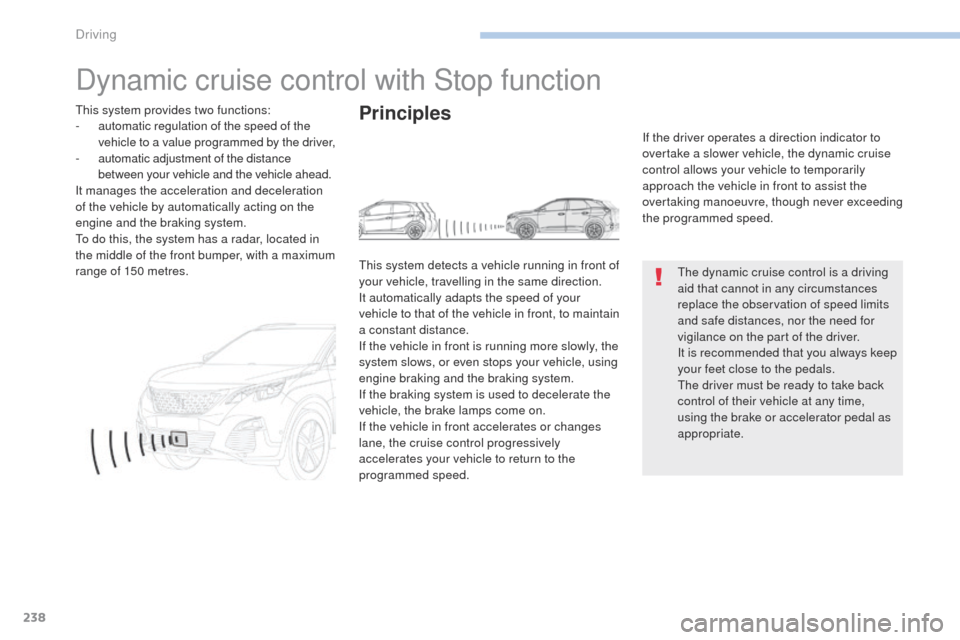
238
3008-2_en_Chap06_conduite_ed01-2016
Dynamic cruise control with Stop function
The dynamic cruise control is a driving
aid that cannot in any circumstances
replace the observation of speed limits
and safe distances, nor the need for
vigilance on the part of the driver.
It is recommended that you always keep
your feet close to the pedals.
The driver must be ready to take back
control of their vehicle at any time,
using the brake or accelerator pedal as
appropriate.
This system provides two functions:
-
a
utomatic regulation of the speed of the
vehicle to a value programmed by the driver,
-
a
utomatic adjustment of the distance
between your vehicle and the vehicle ahead.
It manages the acceleration and deceleration
of the vehicle by automatically acting on the
engine and the braking system.
To do this, the system has a radar, located in
the middle of the front bumper, with a maximum
range of 150 metres.
Principles
This system detects a vehicle running in front of
your vehicle, travelling in the same direction.
It automatically adapts the speed of your
vehicle to that of the vehicle in front, to maintain
a constant distance.
If the vehicle in front is running more slowly, the
system slows, or even stops your vehicle, using
engine braking and the braking system.
If the braking system is used to decelerate the
vehicle, the brake lamps come on.
If the vehicle in front accelerates or changes
lane, the cruise control progressively
accelerates your vehicle to return to the
programmed speed. If the driver operates a direction indicator to
overtake a slower vehicle, the dynamic cruise
control allows your vehicle to temporarily
approach the vehicle in front to assist the
overtaking manoeuvre, though never exceeding
the programmed speed.
Driving
Page 249 of 566
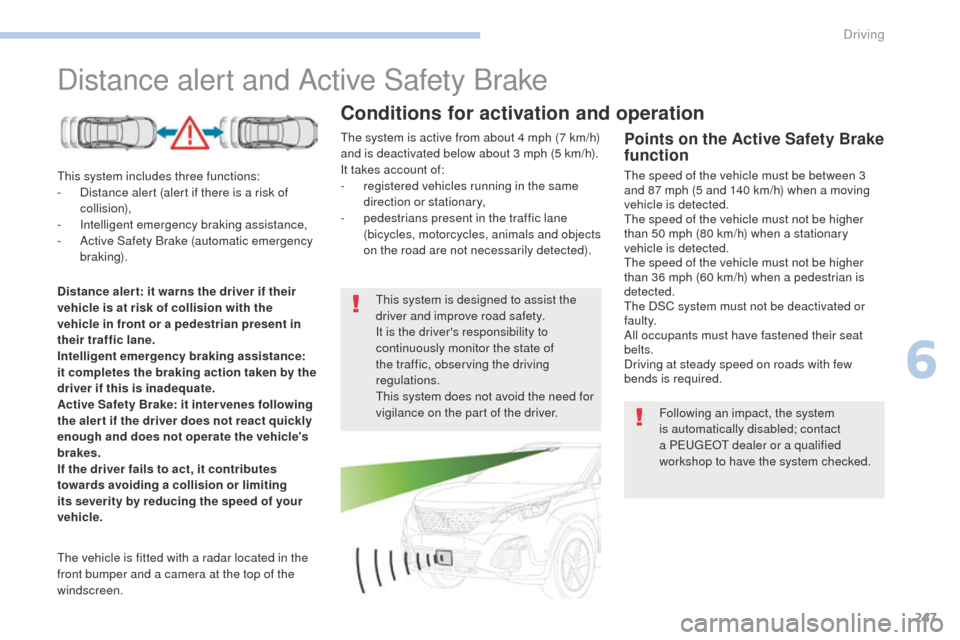
247
3008-2_en_Chap06_conduite_ed01-2016
Distance alert and Active Safety Brake
This system includes three functions:
- D istance alert (alert if there is a risk of
collision),
-
I
ntelligent emergency braking assistance,
-
A
ctive Safety Brake (automatic emergency
b r ak ing).
Points on the Active Safety Brake
function
The speed of the vehicle must be between 3
and 87 mph (5 and 140 km/h) when a moving
vehicle is detected.
The speed of the vehicle must not be higher
than 50 mph (80 km/h) when a stationary
vehicle is detected.
The speed of the vehicle must not be higher
than 36 mph (60 km/h) when a pedestrian is
detected.
The DSC system must not be deactivated or
faulty.
All occupants must have fastened their seat
belts.
Driving at steady speed on roads with few
bends is required.
This system is designed to assist the
driver and improve road safety.
It is the driver's responsibility to
continuously monitor the state of
the traffic, observing the driving
regulations.
This system does not avoid the need for
vigilance on the part of the driver.
The vehicle is fitted with a radar located in the
front bumper and a camera at the top of the
windscreen.
Conditions for activation and operation
The system is active from about 4 mph (7 km/h)
and is deactivated below about 3 mph (5 km/h).
It takes account of:
-
r
egistered vehicles running in the same
direction or stationary,
-
p
edestrians present in the traffic lane
(bicycles, motorcycles, animals and objects
on the road are not necessarily detected).
Distance aler t: it warns the driver if their
vehicle is at risk of collision with the
vehicle in front or a pedestrian present in
their traffic lane.
Intelligent emergency braking assistance:
it completes the braking action taken by the
driver if this is inadequate.
Active Safety Brake: it inter venes following
the aler t if the driver does not react quickly
enough and does not operate the vehicle's
brakes.
If the driver fails to act, it contributes
towards avoiding a collision or limiting
its severity by reducing the speed of your
vehicle. Following an impact, the system
is automatically disabled; contact
a PEUGEOT dealer or a qualified
workshop to have the system checked.
6
Driving
Page 251 of 566

249
3008-2_en_Chap06_conduite_ed01-2016
Modifying the alert trigger
threshold
This threshold determines how you wish to be
warned of the presence of a vehicle moving
or stationary in front of you, or a pedestrian
present in your traffic lane.
The current threshold can be modified via the
vehicle configuration menu in the screen.
You can select one of three thresholds:
- "Distant ",
-
"Normal ",
-
"Close ".
The last threshold selected is kept in memory
when the ignition is switched off.
Intelligent emergency
braking assistance
If the driver brakes, but not sufficiently to
avoid a collision, this system will complete the
braking, within the limits of the laws of physics.
This assistance will only be provided if you
press the brake pedal.
6
Driving
Page 256 of 566
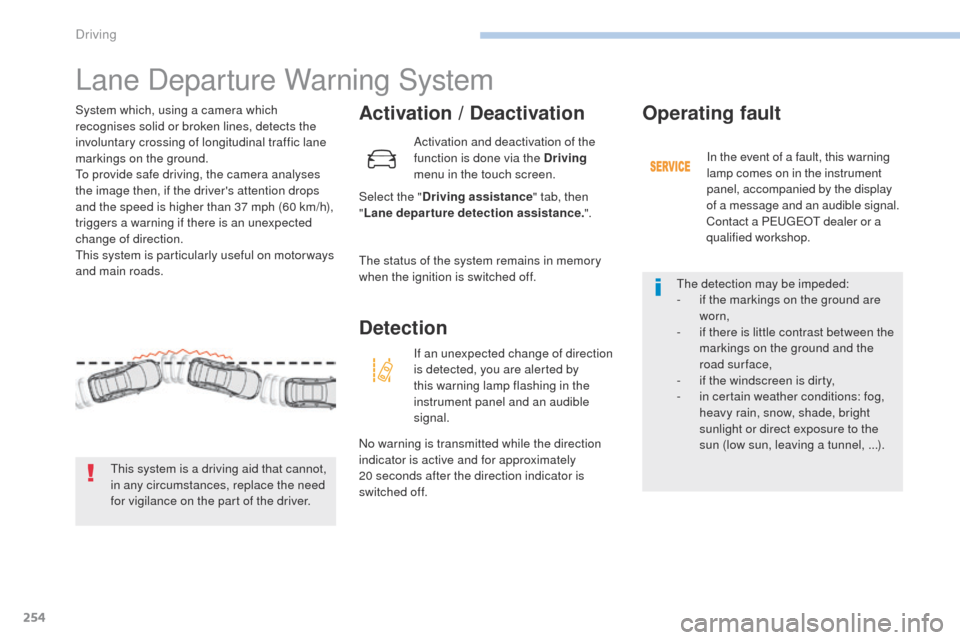
254
3008-2_en_Chap06_conduite_ed01-2016
Lane Departure Warning System
Activation / Deactivation
Select the "Driving assistance " tab, then
" Lane departure detection assistance. ".
System which, using a camera which
recognises solid or broken lines, detects the
involuntary crossing of longitudinal traffic lane
markings on the ground.
To provide safe driving, the camera analyses
the image then, if the driver's attention drops
and the speed is higher than 37 mph (60 km/h),
triggers a warning if there is an unexpected
change of direction.
This system is particularly useful on motor ways
and main roads.
This system is a driving aid that cannot,
in any circumstances, replace the need
for vigilance on the part of the driver. Activation and deactivation of the
function is done via the Driving
menu in the touch screen.
The status of the system remains in memory
when the ignition is switched off.
Detection
If an unexpected change of direction
is detected, you are alerted by
this warning lamp flashing in the
instrument panel and an audible
signal.
No warning is transmitted while the direction
indicator is active and for approximately
20
seconds after the direction indicator is
switched off.
Operating fault
In the event of a fault, this warning
lamp comes on in the instrument
panel, accompanied by the display
of a message and an audible signal.
Contact a PEUGEOT dealer or a
qualified workshop.
The detection may be impeded:
-
i
f the markings on the ground are
worn,
-
i
f there is little contrast between the
markings on the ground and the
road surface,
-
i
f the windscreen is dirty,
-
i
n certain weather conditions: fog,
heavy rain, snow, shade, bright
sunlight or direct exposure to the
sun (low sun, leaving a tunnel, ...).
Driving
Page 257 of 566
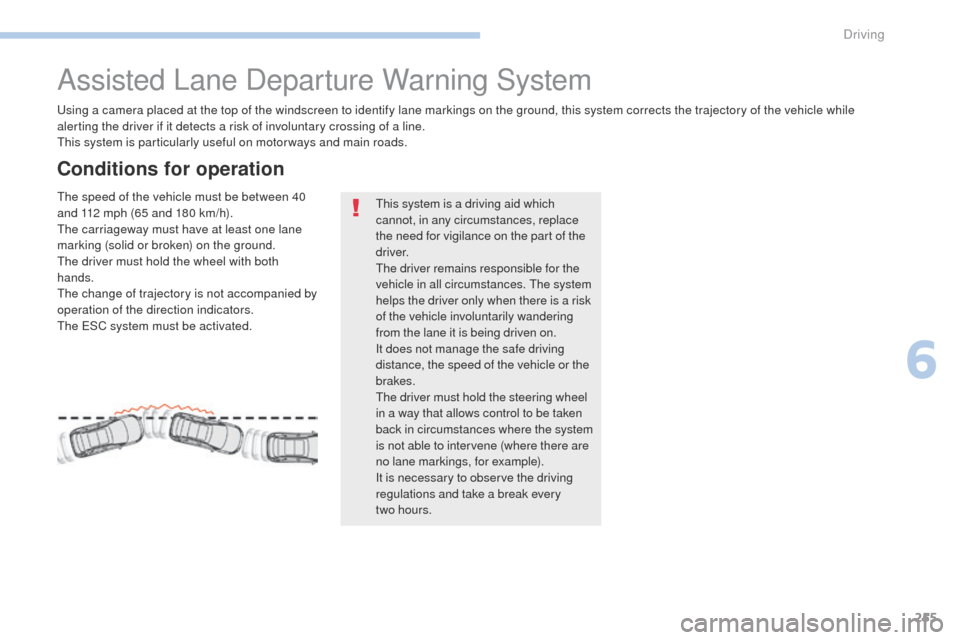
255
3008-2_en_Chap06_conduite_ed01-2016
Assisted Lane Departure Warning System
Using a camera placed at the top of the windscreen to identify lane markings on the ground, this system corrects the trajectory of the vehicle while
alerting the driver if it detects a risk of involuntary crossing of a line.
This system is particularly useful on motor ways and main roads.
Conditions for operation
The speed of the vehicle must be between 40
and 112 mph (65 and 180 km/h).
The carriageway must have at least one lane
marking (solid or broken) on the ground.
The driver must hold the wheel with both
hands.
The change of trajectory is not accompanied by
operation of the direction indicators.
The ESC system must be activated.This system is a driving aid which
cannot, in any circumstances, replace
the need for vigilance on the part of the
driver.
The driver remains responsible for the
vehicle in all circumstances. The system
helps the driver only when there is a risk
of the vehicle involuntarily wandering
from the lane it is being driven on.
It does not manage the safe driving
distance, the speed of the vehicle or the
brakes.
The driver must hold the steering wheel
in a way that allows control to be taken
back in circumstances where the system
is not able to intervene (where there are
no lane markings, for example).
It is necessary to observe the driving
regulations and take a break every
two
hours.
6
Driving